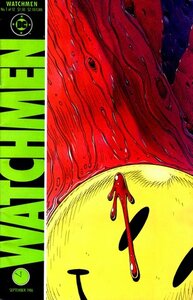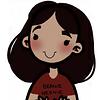You need to sign in or sign up before continuing.
Take a photo of a barcode or cover
105 reviews for:
Watchmen #1: At Midnight, All The Agents....
John Higgins, Alan Moore, Len Wein, Dave Gibbons
105 reviews for:
Watchmen #1: At Midnight, All The Agents....
John Higgins, Alan Moore, Len Wein, Dave Gibbons
I didn't really enjoy or even like reading it but I can't deny that it was well crafted and thought out and even though parts of it felt forced, I think it worked holistically.
"Never compromise. Not even in the face of Armageddon."
What a line. I'm still shook AF. OMG. I'm so glad it lived up to its hype. All I can say is wowwww.
What a line. I'm still shook AF. OMG. I'm so glad it lived up to its hype. All I can say is wowwww.
Wow. I don't read comics...excuse me, graphic novels, but this was amazing. A. maz. ing. There are so many levels of this book, with a very prophetic storyline despite the time in which it was written. The characters are great, and I really liked the "documents" interspersed with the illustrations. I probably won't be able to read any more graphic novels because they won't measure up to this one. Can't wait to see the movie!
DONE FINALLY! I liked Watchmen more than I thought I would. I underestimated the ~comic book medium~. Also watchmen is obviously super dark and sad but I don't think I was very personally invested in it for some reason? I didn't cry. Also I kept trying to read this book while eating and it was a bad idea. So much gross stuff. How many times did Alan Moore have to include the words "bloated corpses"?
An atom-bomb of a story. Superhumans and a host of wannabes grapple with very human issues and a plot to destroy the world, all against the backdrop of cold war annihilation.
While at face value the book appears to subscribe to the standard superhero tropes (superheroes and supervillains both bankrolled by wealthy, deceased parents; a master plan for world domination by a megalomaniac; latex outfits and animal costumes; etc), in reality the book manages to subvert those very same tropes even as it uses them.
The last 30 pages crush like a tidal wave. The ending is NOT what you'd expect--not by a long shot--and the final moral ambiguity of the entire story is both beautiful and thought-provoking, living up to the standards one would normally apply only to the most literary of novels.
While at face value the book appears to subscribe to the standard superhero tropes (superheroes and supervillains both bankrolled by wealthy, deceased parents; a master plan for world domination by a megalomaniac; latex outfits and animal costumes; etc), in reality the book manages to subvert those very same tropes even as it uses them.
The last 30 pages crush like a tidal wave. The ending is NOT what you'd expect--not by a long shot--and the final moral ambiguity of the entire story is both beautiful and thought-provoking, living up to the standards one would normally apply only to the most literary of novels.
Double narratives! Plot within a plot within another plot! Is that villain really a villain? A SQUID? GOOD GOD, THAT ART!
I remember trying to read this over a weekend Sophomore year, just sitting in my bed and just pounding through it, page after page, wanting to finish it in two days to come back Monday and talk about it with friends.
But, well, I failed at that.
That isn't to say I didn't finish, I did, but there was so much I missed by speed-reading it. Most of the above bits, for example, were glossed over in an attempt to add it back to my bookshelf in the finished section. That was the thing, I never paused, just kept reading through as quickly as possible.
First time through, I thought it was quite overrated, that it was nothing more than a defunct superhero story, a piece about failure and living in the past. To be completely honest, I skipped over a lot of the text pieces and much of the Tales of the Black Freighter, mainly because I believed them to be superfluous at the time, that they had little to no bearing to the story at the time.
I didn't pick it up again until about a week before the film came out and actually paced myself through it, one chapter a day for twelve consecutive days. I was reading a new book now, the little details that would be so obvious on a concentrated reading were opening up, Laurie's father being one of those things, the whole of the Fearful Symmetry chapter actually being symmetric with itself, etc. And then Dave Gibbons art, my word, I nearly skipped over most of it the first time, going directly for the speech bubbles, but now the art was there, it popped, it looked better than most recent books, possibly due to a recent recoloring in this collected edition, but still. And then Moore's text pieces at the end of each chapter, the critical background of what was happening, why a certain event never mentioned suddenly has a sense of time, that it's important.
This was actually my first comic, the fact that it appeared on that Time Magazine list made my literary snobbery subside for a moment and give something new a try. Quite glad for that.
I remember trying to read this over a weekend Sophomore year, just sitting in my bed and just pounding through it, page after page, wanting to finish it in two days to come back Monday and talk about it with friends.
But, well, I failed at that.
That isn't to say I didn't finish, I did, but there was so much I missed by speed-reading it. Most of the above bits, for example, were glossed over in an attempt to add it back to my bookshelf in the finished section. That was the thing, I never paused, just kept reading through as quickly as possible.
First time through, I thought it was quite overrated, that it was nothing more than a defunct superhero story, a piece about failure and living in the past. To be completely honest, I skipped over a lot of the text pieces and much of the Tales of the Black Freighter, mainly because I believed them to be superfluous at the time, that they had little to no bearing to the story at the time.
I didn't pick it up again until about a week before the film came out and actually paced myself through it, one chapter a day for twelve consecutive days. I was reading a new book now, the little details that would be so obvious on a concentrated reading were opening up, Laurie's father being one of those things, the whole of the Fearful Symmetry chapter actually being symmetric with itself, etc. And then Dave Gibbons art, my word, I nearly skipped over most of it the first time, going directly for the speech bubbles, but now the art was there, it popped, it looked better than most recent books, possibly due to a recent recoloring in this collected edition, but still. And then Moore's text pieces at the end of each chapter, the critical background of what was happening, why a certain event never mentioned suddenly has a sense of time, that it's important.
This was actually my first comic, the fact that it appeared on that Time Magazine list made my literary snobbery subside for a moment and give something new a try. Quite glad for that.
"The horror of this: in the end, it is simply a picture of empty meaningless blackness. We are alone. There is nothing else."
The first graphic novel I ever read was Jhonen Vasquez’s JTHM: Director’s Cut in high school, and I fell in love with Johnny as an anti-hero, and anti-heros in general. There’s something about the imperfections of these types of characters that make me enjoy the story completely.
That’s why I believe I enjoyed reading Watchmen so thoroughly. The characters, all of them, were so well developed, their stories so interesting, that I couldn’t put this graphic novel down. My absolute favorite story was Dr. Manhattan's. It was written very well, and I was able to see the depth of his character throughout his history and later on in the novel, as he became less and less human.
Other than Dr. Manhattan, none of the other masked heroes have super powers, but they all did what they could to help during a time when they were needed. And they were all, so very, very broken. None of the masked characters in Watchmen could ever be seen as fulfilled human beings, especially while they’re fighting crimes and the depravity of society.
The artwork of Watchmen was phenomenal, and after reading pages, I would take the time to relook at all of the art in this book.
And the storytelling, my was it completely captivating! I really could NOT put this graphic novel down, and when I finished it, it definitely made me want to see the movie and see how it compares to this.
Definitely looking forward to reading more graphic novels and comics in the near future.
Dark, creepy, an honest look at what a vigilante is and how far they should be allowed to go. When the watchmen get out of line, who will be there to stop them? Great characters who are often morally ambiguous or dislikeable, conflicting with their public heroic personas.





